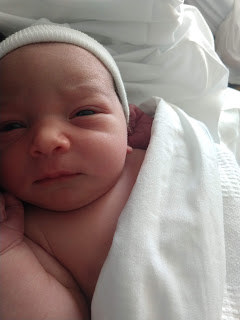The first night we are home with Leo, his breathing becomes restricted, congested.
This makes Scott's breathing feel restricted, congested.
He calls the pediatrician's office.
Sounds like newborn breathing. The nurse on-call tells him. Sure, steam up the bathroom, that might help.
The next day, Friday, March 13, 2020, at Leo's first doctor's appointment, the pediatrician pulls out her stethoscope and listens. She hears wheezing. Soon, on the papered table, he is screaming, which leads to gasping and to the ball of his belly bouncing. The doctor and a nurse check his oxygen. It's a little low.
She cannot clear his nasal passage with the bulb suction. They have more advanced equipment at the hospital, she tells us. Actually, she would like to call an ambulance ... to be on the safe side. She doesn't want us driving all that way alone. What if something happens on the highway? The hospital, where he was born four days before, the one with the children's emergency department, is approximately 25 minutes away.
My parents are home with Amelia, our 4-year-old. I want to go home. I don't want to go back to the hospital. Not on the verge of a pandemic.
I weep as I feed him. When the ambulance arrives with its lights and boxy gravity, I cry harder.
Two paramedics arrive with a stretcher. One, Firefighter Davies, crouches at the car seat and asks the doctor for a summary. At the moment, Leo isn't gasping, but silently sleeping. She explains that when she listened to his lungs, there was wheezing. Then she tells him about the gasping and his oxygen ranging between 92 and 94.
The paramedics strap the car seat to the stretcher and wheel him out to the parking lot. We follow.
Scott will go in the car. I will go with Leo.
In the ambulance, I sit beside the stretcher. Davies is on the other side, attaching a mask to an oxygen hose. The mask is too big and powerful for Leo's newborn body and so he places it on his lap, aiming it toward his mouth. The oxygen monitor is attached to his toe beneath a blanket.
Once we are on the road, Davies looks up and asks,
And how are you doing?
My shoulders shrug. My forehead wrinkles. Tears rise.
The oxygen helps. Soon, Leo's level averages 99.
I always say that you don't need to get nervous unless you see us get nervous.
Davies then explains that Leo's lips and nailbeds are not at all blueish, which would be a telltale sign that he was in trouble.
Soon we are talking about our kids and I am laughing and forgetting, for the moment, that I am in an ambulance with my four-day-old. This stranger, Firefighter Davies, whose job it is to save strangers, fills me with so much hope and gratitude. Hope and gratitude for everyone in our small world who dedicates their life to saving strangers.
At the ER, the nurses and doctors look surprised to see such a small patient wheeled toward their hospital wing.
In a room, under a heat lamp, Leo's bare chest is stickered with wires that connect to blinking, beeping machines. Soon, two young nurses flush his narrow nostrils with saline. Then one holds our baby in place while the other inserts a long tube into each nostril, sucking out all the hidden mucus. Leo screams like he has never screamed. I sob. As soon as the nurses pull away, however, Leo slips into a deep silent sleep and relief settles over me.
Hours later, they do a chest x-ray. They test his mucus for hundreds of infections. They monitor him, checking his temperature, respiratory rate, and oxygen levels.
The Emergency Department doctor says that the mucus will return. It doesn't. The tests come back negative the next morning, and the chest x-ray comes back clear. (A week later, the Coronavirus test also comes back negative).
And there hasn't been a fever?
No, not for his whole little life.
After one night of monitoring, we return home.
That night, it happens again. Congestion. Crying. Gasping. It's our bedroom, I realize. Leo is allergic to something in our bedroom.
We run the shower and close the door. For an hour, I stare at him, wondering if we should call an ambulance. I think about CPR. I think about his painful birth. I think about his lips and nailbeds turning blue. Whenever he cries and gasps, I panic. My parents watch from the couch, unsure of how to help. After the steam and the use of a Nose Frida (a snot sucker), and lots of nursing, Leo's congestion clears. That night, he and I sleep in the living room.
The next morning is Sunday. With the windows open, Scott removes all of the area rugs from our bedroom, vacuums and cleans. Then, he goes to Bed Bath and Beyond and buys an air purifier and a cool-mist humidifier. All day long, wrapped in blankets, Leo sleeps in the cool fresh air of the open door. It works. All night and day, he breathes silently.
By Monday night, we are back in our bedroom.
A week later, I hold Leo in my arms while we lie with Amelia in her bed. Hidden in her room at bedtime, we are safe. Away from invisible infections and the uncertainty of illness, we cuddle as I sing about twinkling stars and sunshine. Once they are both asleep, I weep, allowing my tangled fears to stretch and seep out of me. During this pandemic of isolation and fear and never enough antiseptic wipes, bleach or certainty, I am trying to take one moment at a time. I cannot and should not think in terms of weeks or months, but from moment to moment to moment. Every instant my two children are well, I allow peace and gratitude to surround me. With every clear breath they breathe, I know that this loneliness is worth it.




